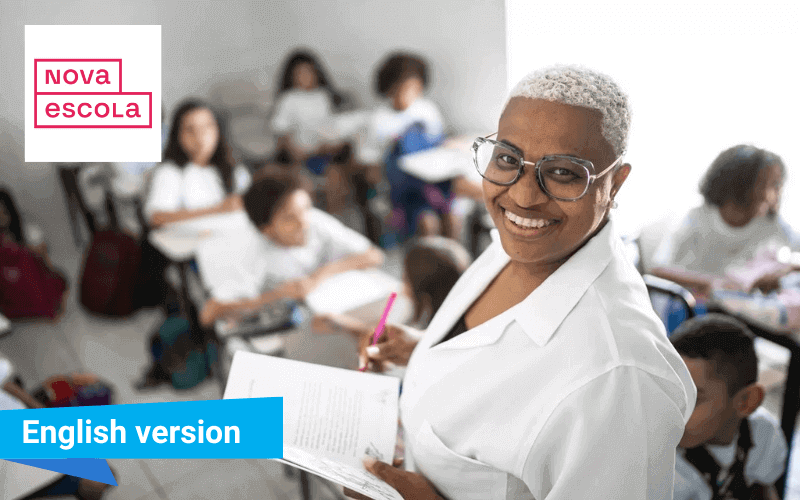Read in
Portuguese
With over 40 million enrolled students, Brazil’s vast education system faces challenges in providing equal access to quality education. To overcome this challenge, Brazil’s government institutions and NGOs have embarked on a collective effort to reform its education system. Spf.io had the privilege of speaking with Ana Ligia Scachetti, the CEO of Nova Escola, an NGO funded by the Lemann Foundation. Scachetti discussed these challenges and their mission.
Addressing the Education Crisis
Brazil’s education crisis stems from “learning poverty,” a term coined by the World Bank indicating the number of children unable to read and understand a simple text by age ten. Learning poverty has a profound impact on Brazilians from low to middle-income groups, as it deprives children of access to educational resources. This issue also results in a gap in learning outcomes between public and private school students. Such a foundational gap can hinder individual and national growth, affecting Brazil’s socioeconomic development and competitiveness on the global stage.
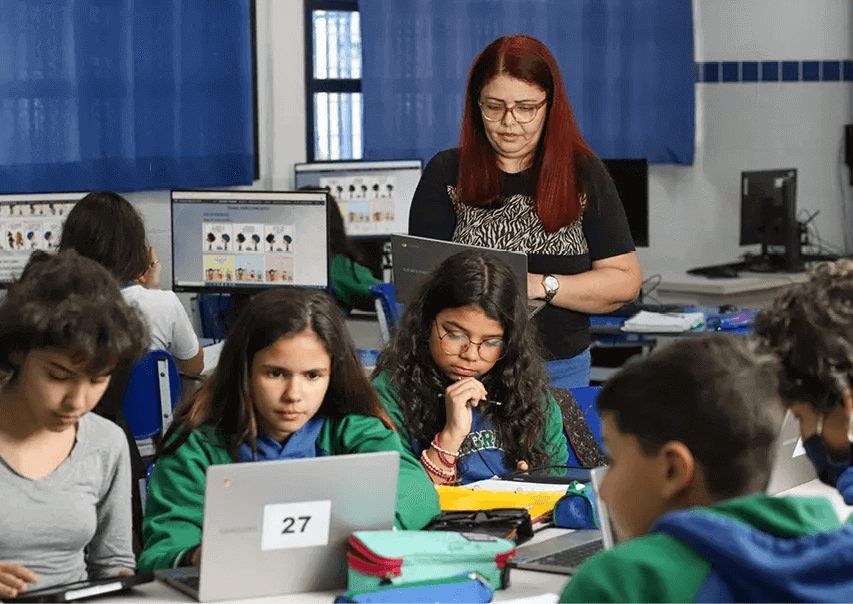
In Praia Grande (SP), 6th year students at EM Orestes Quércia use technological resources during Portuguese language classes. Photo: Fernanda Luz/NOVA ESCOLA.
Organizations like the Lemann Foundation and Nova Escola aim to address this crisis by providing schools with essential resources.
Scachetti notes, “We see that many investments are happening in Brazil to bring technology to schools, ensuring that schools have quality technology, and making the internet accessible for activities, with students in all classrooms.” In addition to technology, her organization provides training and educational materials like textbooks and lesson plans so that teachers have what they need to succeed.
Challenges in Improving Education
A significant aspect of Brazil’s education gap is the state of its English education. While Brazil acknowledges the global significance of the English language, its proficiency level is still categorized as “moderate” according to the EF English Proficiency Index (EPI) 2022. The report states that Brazil has an EF EPI score of 505, ranking 58 out of 111 countries. After being in the “low” category for over a decade, this score shows how much Brazil has advanced as well as the potential to further increase its English proficiency.
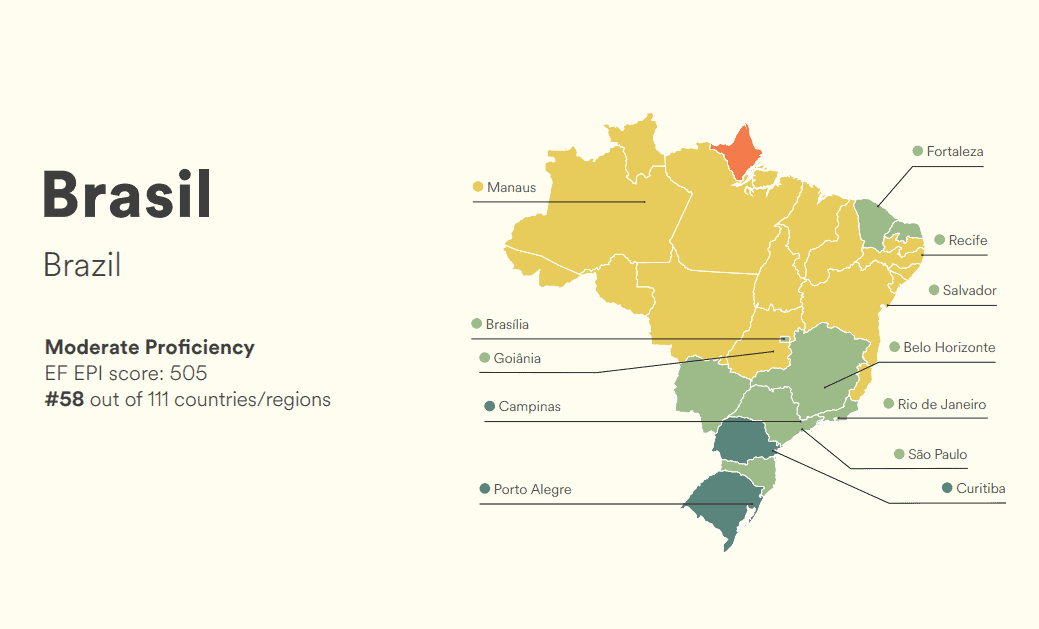
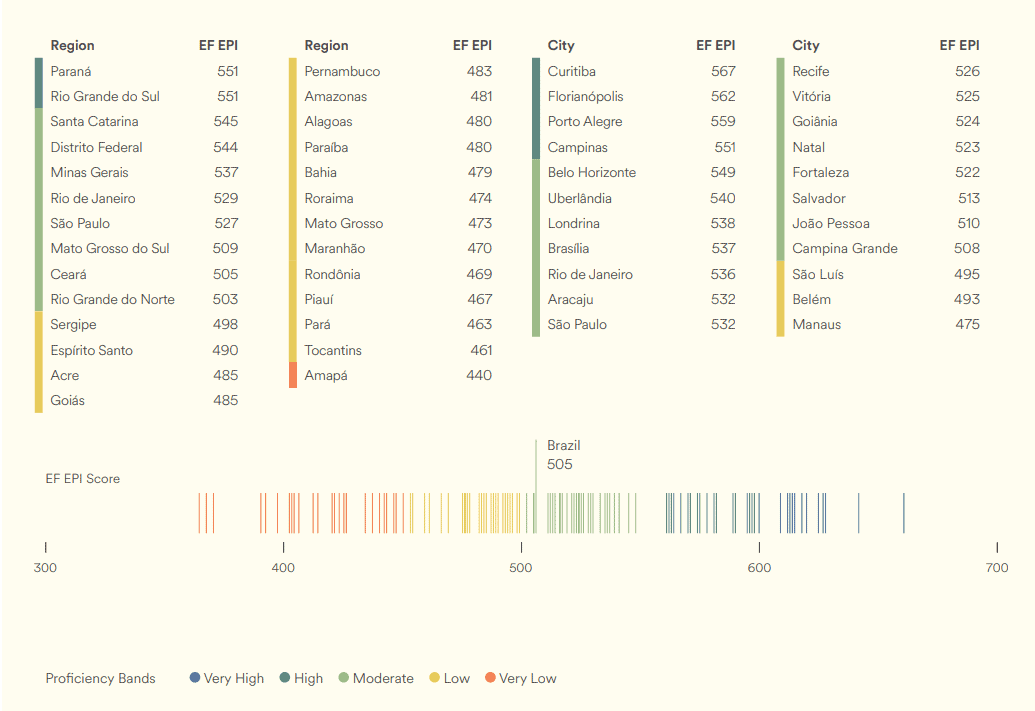
Brazil’s EF English Proficiency Index (EPI) 2022. (source)
In 2017, Brazil took a significant step towards improving its English education by mandating English as a compulsory subject from 6th to 12th grade in public and private schools. However, most public schools grapple with fulfilling this mandate due to an acute shortage of qualified English teachers.
Scachetti highlights the gap between public and private schools, emphasizing the latter’s advantage of having English-proficient teachers and the pressure to allocate more time to teaching English. Meanwhile, teachers in public schools struggle to teach their students due to their own limited proficiency. She also mentions challenges in communicating with immigrant students from other Latin American countries like Venezuela, who often don’t speak Portuguese.
In light of such great challenges, Scachetti emphasizes an important area where technology can make a difference: “I think there is an opportunity to think about ways to support teachers with limited English proficiency.”
Spf.io is one technology designed to do exactly that.
Supporting Teachers with Limited English Proficiency
Spf.io (pronounced spiffy-oh) provides AI-powered classroom translation, allowing teachers to continue teaching in Portuguese while enabling students to learn English. Students can listen and read subtitles on their chromebooks, laptops, or even on the lower third of a classroom screen. Moreover, spf.io enables teachers to translate learning materials, enhancing their own understanding and that of their students.
This technology was recently demonstrated during the Teacher Tech Summit, a collaboration between T4 Education, Nova Escola, and spf.io.
Highlighting the importance of multilingual collaboration to address educational challenges, Vikas Pota, the founder and CEO of T4 Education, shared: “As a global company, working to support schools all over the world in improving education, building strong cultures, and harnessing technology, the ability to bring teachers together across many different languages is invaluable. We have been proud to partner with spf.io on the Teacher Tech Summit 2023 to open up the conversations that really matter to educators everywhere.”
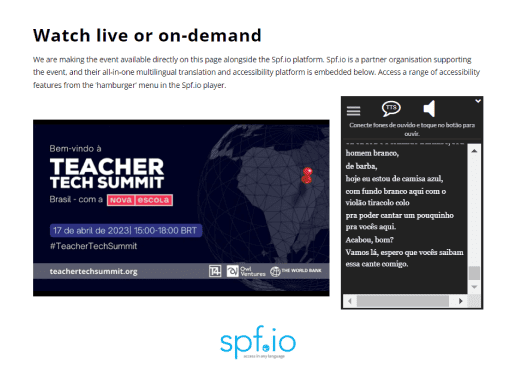
T4 Education, Nova Escola, and spf.io partnered together for the Teacher Tech Summit 2023 in Brazil.
The summit served as a platform for teachers to share their experiences and explore global educational solutions. Thanks to Portuguese and English captions powered by spf.io, teachers could share their knowledge and best practices seamlessly in the language they preferred while being understood by everyone. Making this technology available in every classroom would be a major boost for teachers and a powerful tool to help accelerate Brazil’s educational goals.
Reflecting on the collaboration, Chris Lim, founder and CEO of spf.io said, “We’re excited to partner with forward-thinking organizations like Nova Escola and T4 Education to bring AI innovation to the classroom and bridge the multilingual education gap in Brazil.”
Read in
Portuguese
Let's innovate together.
Contact us for partnership opportunities.

